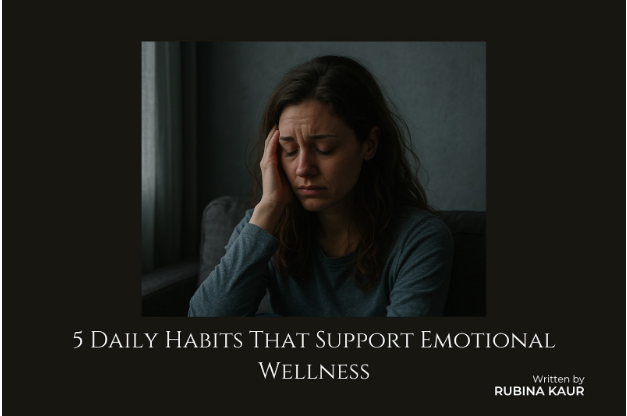








In today’s fast-paced world, emotional wellness is no longer a luxury, it’s a necessity. From work stress to family responsibilities, life often feels overwhelming. The truth is, our emotional health influences everything: the way we think, how we interact with others, and even our physical well-being. The good news? You don’t need a drastic lifestyle change to support your mental health. By incorporating a few simple, science-backed daily habits, you can cultivate inner balance, resilience, and lasting emotional wellness.
Here are five daily habits that therapists, psychologists, and wellness experts recommend for a healthier, more grounded emotional life.
Mindfulness is more than just a trendy buzzword; it's a proven method to calm the mind and reduce anxiety. A study by Harvard University found that mindfulness meditation can physically change the brain’s structure, increasing areas linked to focus and emotional regulation.
Why it works: Mindfulness brings your focus to the present moment, lowering stress hormones like cortisol and improving clarity.
Exercise isn’t just for physical fitness; it's one of the most effective natural antidepressants. When you move your body, it releases endorphins, known as “happy hormones,” which lift mood and reduce anxiety.
Famous point: According to the Anxiety and Depression Association of America, just 10 minutes of daily physical activity can reduce stress levels significantly.
Gratitude is like a reset button for the mind. By shifting focus from what’s lacking to what’s abundant, you train your brain to see positivity even in challenging times.
Why it matters: Research from the University of California, Davis, shows that people who practice gratitude consistently report fewer health issues and higher levels of happiness.
Sleep is the foundation of emotional wellness. Without enough rest, emotions become harder to regulate, stress feels amplified, and decision-making suffers.
Famous fact: The National Sleep Foundation recommends 7–9 hours of sleep for adults. Missing even one night of quality rest can mimic the effects of anxiety and depression.
Humans are wired for connection. Having supportive relationships strengthens emotional resilience and provides a sense of belonging. Loneliness, on the other hand, has been linked to higher stress, depression, and even physical illness.
Why it matters: A long-term Harvard study on adult development revealed that strong relationships are the single most important predictor of happiness and emotional wellness.
Emotional wellness isn’t about perfection it’s about consistency. By practicing mindfulness, moving your body, showing gratitude, prioritizing sleep, and nurturing relationships, you build a lifestyle that supports mental balance and inner peace.
Start small. Choose one habit today and build from there. Over time, these daily practices will not only support your emotional wellness but also transform the way you experience life.
If you're ready to create a sustainable self-care routine and strengthen your emotional resilience, we can help with personalized strategies and therapeutic support.
If this article resonated with you, share it with others who might benefit from these insights.